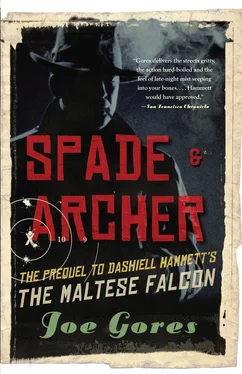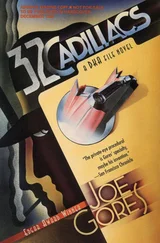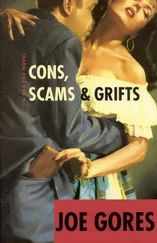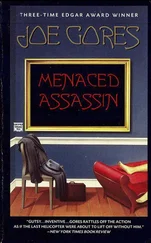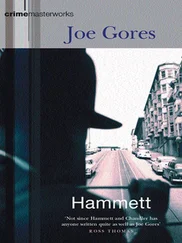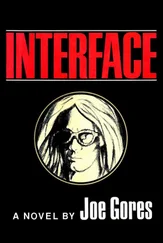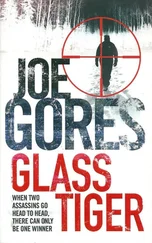“Hmmm. Not long enough to go out through the Gate and back. Where does he hide the booze until it gets picked up?”
“Sometimes Angel Island. Sometimes below Yellow Bluff. Here in town is a couple places built on stilts so the water washes in underneath them, deep enough to bring a boat in. The booze can sit there above high tide until they can truck it out.”
“He go out alone? Come back alone?”
“Out alone. Back with someone. Nobody saw ’em clear.” Benny Ruiz flicked ash from his Fatima onto the floor and screwed up his heavy face in a worried look. “You think maybe he was this St. Clair McPhee guy you’re looking for?”
“Seems likely,” said Spade. He drew on his cigarette, emptied his wine glass. Benny refilled it. “You talk to Fingers yourself after he got back?”
“Sure. He was half lit, talkin’ ‘bout a big bootleggin’ syndicate they was gonna set up, playin’ as if he’d actually been out on a liquor run. Then he shut up quick, like he’d said too much. He didn’t say no more.”
“Anything on the other two guys?”
“Second was Fingers’s cousin Figueiro Mondego. The third was a tough bird named Villalba Berlingas. Fingers couldn’t hardly talk. Big black-and-blue marks on his neck.”
Spade nodded. “The ringleader. He had a baseball bat.”
“Figueiro had a almost-busted jaw and missin’ teeth.”
“Brass knucks,” said Spade.
“An’ Villalba had busted eardrums. Still had dried blood down the side of his neck when I saw him.”
“The shiv,” said Spade.
Benny looked around, hunched toward Spade across the table.
“Thing is, last night I sat in at the game in the hotel, made a fin. After midnight I was climbin’ up the hill to my rooming house when somebody jumped me. I figured it was ‘cause I’d won at the game. But he tried to knife me.” He held up his left arm. “Just a scratch, but if I hadn’t of blocked it...”
“So you cleared out,” said Spade.
“Well, I didn’t see the guy cut me, but Villalba’s good with a shiv. So this morning early I jumped the San Rafael train, hung on the outside of the caboose. Jesus, was it cold! Dropped off below the station here in Larkspur. Didn’t nobody see me get on or off. Got a room. Called you.”
“Smart man,” said Spade. He finished his wine, got to his feet. He dropped a twenty-dollar bill on the table. “You hear anything, let me know. I hear anything, I’ll let you know. You can use your time trying to figure out where the San Anselmo loot might be hidden. Find that, you’ll get some reward money.”
He left Benny Ruiz looking thoughtful.
12
Dead Men Tell No Tales
When Spade boarded the ferry in Sausalito for the return trip to the city, it was full dark and the fog was in, heavy and wet. The half a hundred passengers were all inside, crowding the seats near the engine-room wall, where the warmth seeped out.
He went to the stand-up counter next to the cigar-and newsstand. A dark-eyed girl with short frizzy red hair and a waitress uniform poured him black coffee without asking.
“Thanks,” said Spade. He laid down his nickel. “Say, how about a roast-beef sandwich to go with it?”
She brought him the sandwich on a plate with mashed potatoes and brown gravy. Spade paid his forty-five cents, ate it standing. Then he pulled his hat low on his head, wrapped his topcoat tightly around himself, and started toward the door.
“You aren’t going out into that weather!” exclaimed the waitress in a concerned voice.
“Cold air helps me think,” said Spade, grinning.
The squat ferryboat was plowing through the waves with a lurching up-and-down motion. The engines seemed to be straining, off-key. From every direction came blaring horns and moaning whistles, the jangling of bells. Despite the lights above the deck, Spade couldn’t see even the bow of the vessel.
Brief light was laid across the deck as another hearty soul emerged from the cabin. The door shut; again it was dark.
“Filthy night,” said a man’s voice full of tension.
As Spade started to turn toward the tension, he was struck on the side of his head with something blunt and hard. His hat partially absorbed the force of the blow, but it was what prizefighters call a quitter. He was still awake, trying to see the face of the man who had struck him, but when a foot swept his feet out from under him he went down hard on his side.
Quick hands tried to roll him off the deck between the railing stanchions. He caught one of the supports, wouldn’t let go. A heavy boot drove into his side once, again. He felt a rib give. His feet were shoved over the side, his torso followed. No splash would be heard in the moan of wind and din of waves. Only his clinging hand kept him from dropping into the water.
Fingers tore at his fingers. Ripped them free. He was falling. He got the other hand hooked over the edge of the deck, hung on, invisible. The door swung open again, laying down light, emitting unconcerned voices. The door shut. He was alone.
Spade’s volition was returning. He got the fingers of his other hand, strong as steel hooks, curved over the edge of the deck. Flexed his arms as if doing a pull-up on a gym bar. Shot his right arm out, gripped the base of the stanchion again. When he did the same with his left hand, pain shot through his torso from the cracked rib. He did not let go.
Spade began swinging himself from side to side. On the fourth try he hooked a shoe around another stanchion. Twisted his body, stifling a cry at the pain from his rib cage. But he had rolled himself up onto the deck once more.
He lay there for minutes, hatless, breathing harshly. He finally dragged himself to his feet by clinging to the railing. He shambled to the very bow of the craft, stayed there hunched in the shadows, where he could remain unseen until the boat had slid into its berth at the Ferry Building.
Spade, last off, found a corner in the echoing terminal. After twenty minutes without spotting any watchers, he went gingerly out to the streetcar circle and caught a car to the Sutter Hospital to get his ribs taped. From there he went to his apartment and drank enough Bacardi to put himself to sleep.
At 8 a.m. he sat up groaning, called the office, told Effie Perine he would not be in that day, and hung up without telling her why, or where he was.
He got central again, asked for the Blue Rock Inn across the bay in Larkspur. The connection took five minutes, which he spent hunched on the side of the bed, shivering, rolling and smoking a cigarette. Finally he got through, asked for Benny Ruiz by description instead of the phony name he was using.
Another two minutes, he had Benny’s voice in his ear. He said, “Those three birds won’t be bothering you anymore.” A pause. “Gotcha. I’ll go back to town this morning.” Spade stubbed out his cigarette, lay back down groaning.
When Spade, pale but clean shaven, clear-eyed, and moving well, walked into his office at 11 a.m. on Friday morning a uniformed bull was standing outside the hallway door. Inside, Polhaus bulked large next to the door, arms crossed, dissociating himself from Dundy, who was leaning over a cowering, white-faced Effie Perine, jabbing a finger at her face.
“Quit stalling, sister. I want to know where your boss—”
Spade caught Dundy by the back of his suit-coat collar, winced slightly as he spun the sergeant around before Tom Polhaus could even get his arms uncrossed. The uniformed man was frozen in place outside.
Blood suffused Dundy’s face and his fists clenched. His right arm started to move, but by then Polhaus had interposed his bulk between the two angry men.
“Get him out of here.” Spade’s neck was bulging; the whites of his eyes were limned in red.
Читать дальше
